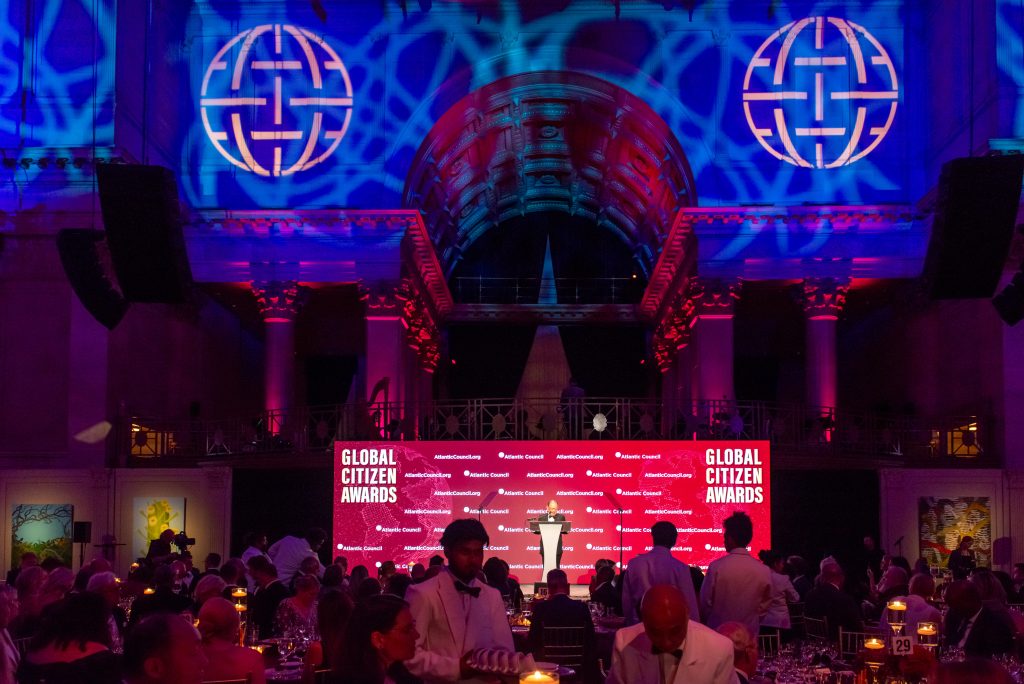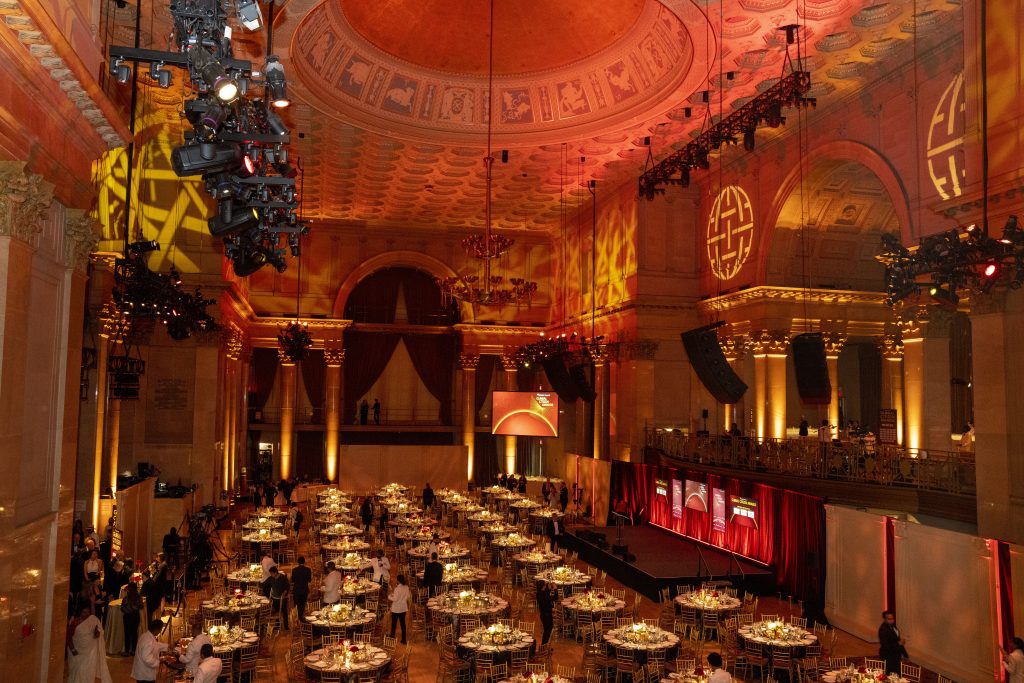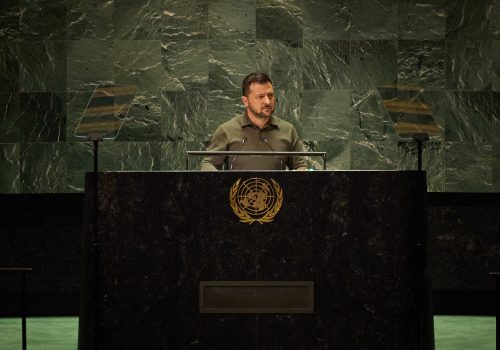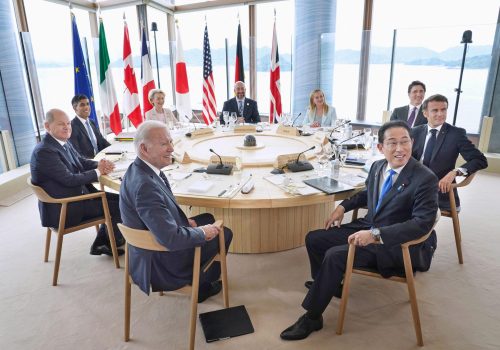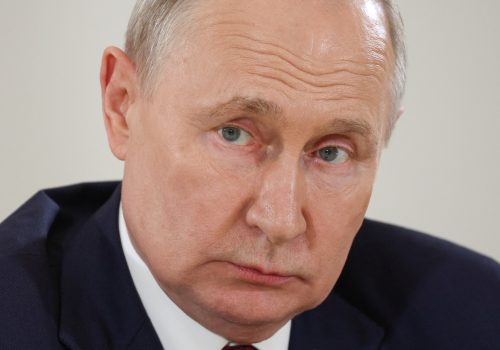“To be honest, this is not my award,” said Ukrainian President Volodymyr Zelenskyy at the Atlantic Council Global Citizen Awards on Wednesday night in New York. The award, he explained, instead belonged to Ukrainian men and women in uniform, to the Ukrainian children killed by Russian forces, to doctors and teachers back home, to the United States and the European Union and all the countries that help Ukraine fight for its survival. He looked first to others, showcasing the unselfish spirit that each of the Global Citizen Award honorees shares.
Atlantic Council Chairman John F.W. Rogers drew attention to this paradox in his opening remarks: those most deserving of honor for their impact on the world are often the most selfless. The honorees, he explained, are examples of “civic virtue—symbols of self-regard giving way to the common good.”
In addition to Zelenskyy, the Global Citizen Awards also honored Japanese Prime Minister Fumio Kishida, German Chancellor Olaf Scholz, and US Treasury Secretary Janet L. Yellen. Victor L.L. Chu, the chief executive officer of First Eastern Investment Group and co-founder of the Global Citizen Awards, received a special Distinguished Service Award for his contributions to the Atlantic Council and a better world.
Amid the celebration of the honorees in the room, Atlantic Council President and Chief Executive Officer Frederick Kempe praised the courage and resilience of someone behind bars thousands of miles away: Evan Gershkovich, a Wall Street Journal reporter who has been “falsely and cynically accused of espionage” by the Russian government and has been detained in Moscow since March 29. Honoring Gershkovich’s parents, who were in attendance, Kempe spoke of the need for the journalist’s release. “We are prepared to do whatever we can as a global community to bring Evan home,” he said.
Volodymyr Zelenskyy: An award for Ukrainians and those who fight for freedom and democracy
- Hours after his address to the United Nations General Assembly, Zelenskyy accepted his Global Citizen Award to a standing ovation. “Tomorrow, I will be in [the] White House, so I have to save energy,” he said, making light of his brief remarks.
- “To be serious and to be very honest,” he then said, the true honorees were others. “I address this award to Ukrainian men and women in uniform,” he said. “I address this award to all our sweet children who have been killed by Russian terrorists—I will never forget them.”
- Zelenskyy thanked “all brave countries who have been with us and supported us.” He also thanked the doctors and teachers who have stayed in Ukraine, providing care and instruction even under attack from Russian missiles and Iranian drones.
- “I address this award to all the people in the world who fight for freedom and democracy, like we Ukrainians,” he concluded. “Slava Ukraini.”
“I address this award to all our sweet children who have been killed by Russian terrorists.”
— Atlantic Council (@AtlanticCouncil) September 21, 2023
Ukrainian President @ZelenskyyUa accepts the @AtlanticCouncil’s 2023 Global Citizen Award.
Sign up to watch the exclusive 9/28 broadcast. :arrow_right: https://t.co/aQl2lrLw7I #ACAwards pic.twitter.com/e8iwI1jnlb
Register to watch the full broadcast on September 28:
Olaf Scholz: Germany will support Ukraine for ‘as long as it takes’
- “Russia’s brutal war of aggression against Ukraine is being fought in Europe,” said Scholz. But it is also an “attack against fundamental principles of our international order.”
- That is why Scholz called Russia’s full-scale invasion “a watershed moment—a Zeitenwende. There is a before and an after.” In the invasion’s aftermath, Scholz said, Germany became “second only to the United States” in terms of humanitarian aid, military training, and heavy weapons for Kyiv. Germany, he said, had also “become independent from Russian energy” and is now “decisively increasing” its military presence in the Baltic states.
- “Russia’s war has failed utterly,” said Scholz, “because of the courage of the Ukrainians, and because of the unity of all those who stand for an international order of equals.”
- “But the suffering,” he emphasized, “is not over. Russia continues its brutal aggression against the people of Ukraine and against the very foundations of international law.” This is why, Scholz said, Germany will remain “steadfast” in its support for Ukraine for “as long as it takes.”
- Scholz also emphasized his “determined” support for free trade, arguing that “decoupling, reducing trade to just friends, or ever higher trade barriers, are not the answer.” But, he said, “being ‘free traders’ puts us into a category of species that seems to be increasingly endangered, even in its natural habitat, here in the United States.”
- Before presenting the German chancellor with the award, World Trade Organization Director-General Ngozi Okonjo-Iweala said she was inspired by Scholz’s “dedication to fostering greater global understanding in a world that seems increasingly and frighteningly divided.”
“Russia’s war has failed utterly because of the courage of the Ukrainians.”
— Atlantic Council (@AtlanticCouncil) September 20, 2023
German Chancellor @OlafScholz accepts the @AtlanticCouncil’s 2023 Global Citizen Award.
Sign up to watch the exclusive 9/28 broadcast. :arrow_right: https://t.co/aQl2lrLw7I#ACAwards #GCA2023 pic.twitter.com/S6SgqHP65I
Fumio Kishida: A vision of peace, even amid ‘harsh realities’
- In May, Kishida hosted leaders from the Group of Seven (G7) developed economies for a summit in Hiroshima. In New York on Wednesday, he underscored how the “pledge for peace” that the G7 represented should be carried forward, even when peace is elusive.
- Kishida shared how the G7 leaders in Hiroshima visited and learned from hibakusha, the survivors of the atomic bombs dropped in August 1945. At the Hiroshima Peace Memorial Park, he said, “we shared in a renewed determination to work together toward a world without nuclear weapons.”
- As Russia continues its nuclear saber-rattling over Ukraine and the threat of nuclear proliferation reverberates elsewhere, Kishida acknowledged the “harsh realities of this world,” which make the goal of nuclear disarmament difficult.
- Yet Kishida, who accepted the award as “a citizen of Hiroshima,” also emphasized that it is the responsibility of political leaders to “find a pathway” so that the efforts and sacrifices of the hibakusha and others who work for peace are not in vain.
- “All of us here are standing on the shoulders of those unsung heroes,” Kishida said. “We should never let their efforts and sacrifices end as a mere dream.”
- Before presenting the award, European Commission President Ursula von der Leyen praised Kishida’s visit in March 2023 to Bucha, Ukraine, following Russia’s vicious attack on that city. “For the first time since World War II, a Japanese prime minister visited a country at war,” said von der Leyen. “And you brought with you Japan’s solidarity in words and deeds.”
- Von der Leyen also praised Kishida’s leadership in the face of Russian President Vladimir Putin’s nuclear threats: “Right from the beginning of this war, Japan’s position was clear. As the only country that has suffered from atomic bombings, you have made the whole world listen.”
“Today, let us remember those who gave their lives and sacrificed everything for peace.”
— Atlantic Council (@AtlanticCouncil) September 21, 2023
Japanese Prime Minister @kishida230 accepts the @AtlanticCouncil’s 2023 Global Citizen Award.
Sign up to watch the exclusive 9/28 broadcast. :arrow_right: https://t.co/aQl2lrLw7I#ACAwards #GCA2023 pic.twitter.com/oVxiUmCpr9
Janet L. Yellen: Multilateralism is the answer, not isolationism or retrenchment
- “America is strongest when we engage with the world,” Yellen said. This lesson, she explained, became clear as nations emerged from the destruction of World War II. In the years that followed, the United States, allies, and partners set a new course based on the idea that “each nation’s stability and growth depended on our collective security and prosperity.”
- Starting as secretary of the Treasury in the depths of the COVID-19 pandemic, Yellen explained, “underscored just how interconnected we all are.” It was therefore an imperative for the administration to demonstrate far and wide “that American isolationism and retrenchment were over,” she added.
- The importance of multilateralism was underscored even more recently by the united response to Russia’s full-scale invasion of Ukraine. Watching how Ukrainians have “fought for their lives and freedom, and for the values we all share,” Yellen said, stiffened the resolve of many nations to respond—and to do so together. The result included an unprecedented multilateral sanctions regime and a novel price cap on Russian oil exports, which was much more powerful than what any one country could do alone.
- “This commitment to multilateralism should drive our continued efforts to exert more pressure on Russia to end its unjust war, and to support the Ukrainian people,” Yellen explained. And, she added, it should shape responses to other issues, ranging from climate change to a fairer international tax system.
- “We have to go at it together if we want to make our nations and the world safer, healthier, and more prosperous,” Yellen said.
- When presenting Yellen with the award, Canadian Deputy Prime Minister Chrystia Freeland said she has “led and delivered a return of US economic leadership in the world.” Freeland added that the Treasury secretary herself inspires “the billions of women around the world who see in Secretary Yellen their own rightful place at the head table of global leadership.”
“America is strongest when we engage with the world.”@USTreasury Secretary Janet L. Yellen @SecYellen accepts the @AtlanticCouncil’s 2023 Global Citizen Award.
— Atlantic Council (@AtlanticCouncil) September 21, 2023
Sign up to watch the exclusive 9/28 broadcast. :arrow_right: https://t.co/aQl2lrLw7I#ACAwards #GCA2023 pic.twitter.com/89i7rJILNh
Victor L.L. Chu: ‘We never walk alone’
- Chu explained that his parents instilled in him the value of education and public service at an early age. If his mother were still alive to see her son receive the Global Citizen Award, Chu said, “She would be completely thrilled and delighted.” His father would have been pleased, he noted, but he would have added, “Victor, this is not good enough.”
- Chu then explained that his generation had escaped hardships felt by earlier generations. “For those of us who have been brought up in the last sixty, seventy years—in a period of peace, stability, and strong economic growth—in my father’s words, ‘We have never weathered the storm.’”
- At the same time, the challenges to society today are “unprecedented,” Chu said, ranging from climate change and conflict to food insecurity and artificial intelligence. What is the solution to these multifaceted problems? “We need to have more compassion. We need to communicate constructively. We need to engage more frequently,” he said.
- Working together is critical. “As a Liverpool Football Club fan for more than fifty years,” he concluded, “we have to remember we never walk alone.”
- In presenting Chu with the award, World Economic Forum Founder and Chairman Klaus Schwab said that trying to do justice to Chu’s many accomplishments is like “trying to capture the essence of a symphony in a single note.”
Multifaceted problems require global collaboration, says Chairman & CEO of First Eastern Investment Group Victor L.L. Chu after receiving the @AtlanticCouncil’s Distinguished Service Award.
— Atlantic Council (@AtlanticCouncil) September 21, 2023
Sign up to watch the exclusive 9/28 broadcast. :arrow_right: https://t.co/aQl2lrLw7I#ACAwards pic.twitter.com/z5GwhX8Otu
John Cookson is the editor of the New Atlanticist.
Daniel Hojnacki is an assistant editor at the Atlantic Council.
Further reading
Wed, Sep 20, 2023
Will Zelenskyy’s Washington visit help deliver ATACMS for Ukraine?
New Atlanticist By John E. Herbst
The White House is worried about the counteroffensive, but it has held off on supplying Ukraine the missiles that would help make a breakthrough.
Sat, May 20, 2023
Experts react: A ‘game changer’ G7 summit in Japan
New Atlanticist By
As leaders of the Group of Seven countries gather in Hiroshima, Atlantic Council experts share their insights on what is coming out of the summit about Russia, China, the global economy, and more.
Fri, Sep 8, 2023
Five ways the West might increase pressure on the Russian economy
New Atlanticist By Brian O’Toole, Daniel Fried
The crumbling Russian macroeconomy may entice Western policymakers to knock Russian President Vladimir Putin and his power centers further off balance.
Image: Atlantic Council Chairman John F.W. Rogers opens the 2023 Global Citizen Awards.
